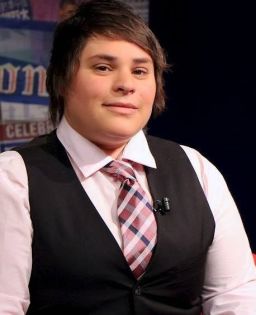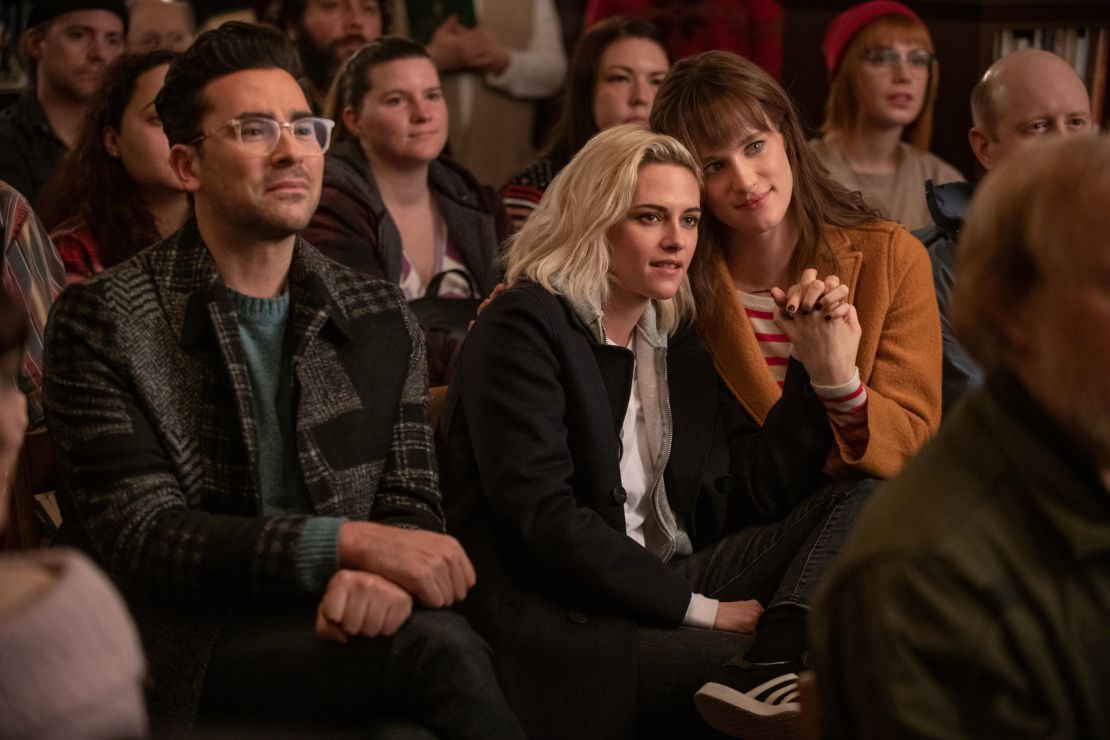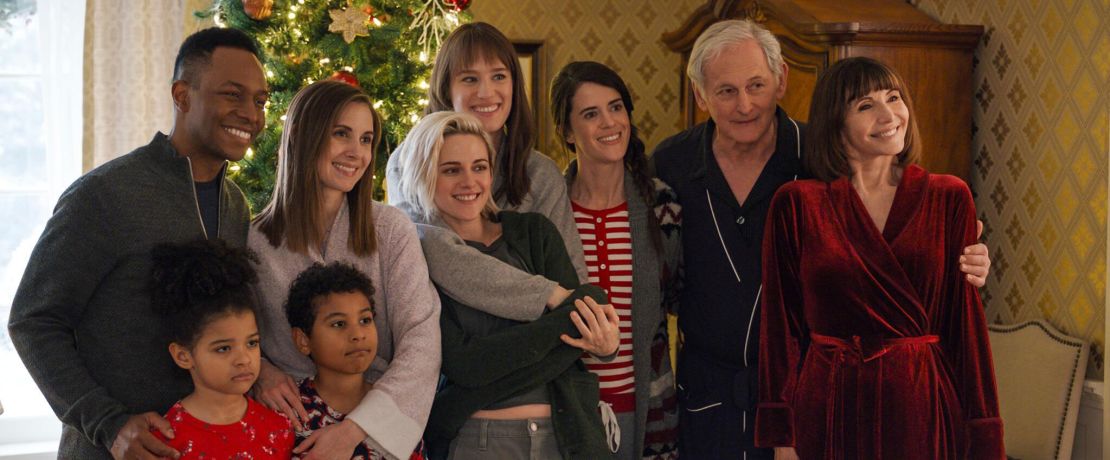Editor’s Note: Allison Hope is a writer whose work has been featured by CNN, The New York Times, The Washington Post, Slate and other outlets. The views expressed here are the author’s. Read more opinion on CNN.
If 2020 has taught us anything, it’s that the more things change, the more they stay the same. We think that facing a global pandemic is unique, but then we remember, oh right, that was so 1918. We think we can tune into the new blockbuster holiday movie and it will offer a refreshing new take on what family and love look like in 2020, only to realize it feels a whole lot like 1993.

“Happiest Season,” which premieres on Hulu on November 25, stars Kristen Stewart as Abby and Mackenzie Davis as Harper, a lesbian couple pretending to be “just friends” when they go home to Harper’s for the holidays – because, in a total surprise to Abby while they’re on their way, Harper lets on she isn’t out to her family. Instead, she introduces Abby as her friend who is joining them because she’s an orphan.
Also starring is “Schitt’s Creek” fan favorite Dan Levy as Abby’s best friend, John.
Harper’s family seems perfectly nice, if overly conventional. They aren’t overtly homophobic, but Harper is still afraid to come out to them because, as is the case with the families of so many LGBTQ people, they haven’t created a home that affirms options for their kids’ gender and sexual identities.
In one scene at the family’s holiday soiree, John (a gay man) masquerades as Abby’s pining ex-boyfriend, proclaiming to Harper’s mother that he is “very sexually attracted” to Abby, “a female.” It’s a moment played for heavy-handed comedic effect because we know the secret – but Harper’s mother (played by Mary Steenburgen) smiles approvingly. For me, the moment summoned an exhausting historical contrast between the high tolerance for R-rated straight sexuality on screen and the anxiety around showing even the slightest G-rated amount of same-sex affection.

“Happiest Season” will be, for some, the perfect escapist family holiday movie – particularly if you were hoping to get in your time machine and go back to the 1990s. As entertainment, it backslides roughly 20 or 30 years in LGBTQ progress by leaning on some very old (and very straight) tropes, and there’s frankly no excuse for it. Except, well, 2020.
But there is no good reason to dial back the representation clock by putting two hyper-feminine White women back in the closet for a Hallmark-esque plastic performance. Hell, even Hallmark knows better in 2020.
I might want to escape from 2020 into a feel-good film as much as the next person, but I definitely don’t want to do it by going back to the 1990s. This year already feels too much like 1993 (which was, among other things, the year of “don’t ask, don’t tell”) politically, with an administration that has tried, and too many cases, succeeded in chipping away at LGBTQ rights – pursuing an anti-LGBTQ agenda in the nation’s highest court, rolling back health care protections for transgender people and others and trying to ban diversity training in the federal workplace. Earlier this month marked the observance of Transgender Awareness Week and Transgender Day of Remembrance – in a year marred by a record number of killings of trans people.
Many LGBTQ Americans – in fact many people who inhabit minority identity categories, period – are weary. We are tired of being afraid, of being misunderstood. Of being rolled up into the most superficial versions of ourselves just to be palatable to some of the very people who vote against our families, our bodies, our right to exist.
“I’m so excited, I can’t believe you’re finally going to meet everyone,” Abby says to her girlfriend as they drive to her parents’ house for the holidays in “Happiest Season.”
“There’s something that we should talk about,” Harper says. “I didn’t tell my parents I’m gay.”
“This is why I hate Christmas. It brings out the worst in everything,” Abby laments.
The truth is, this movie feels like a throwback to the worst in heteronormative Hollywood.

For many lesbians like me, the 1990s were filled with anticipatory trips to the neighborhood video rental store, where we first had to scan to make sure no one was looking as I slipped behind the curtain marked “Adult,” bypassed the porn titles and arrived at the comforting “Gay and Lesbian” section. I then promptly rented any and every title available – because generally there was only one that I hadn’t seen – and watched it, even though oftentimes, it was terrible. If the production quality was decent, the plotline was guaranteed to be problematic, or the inverse was true.
These movies (remember “Chasing Amy?”) were often written and directed by straight men – or featured women who initially expressed interest in another woman (either through one awkward sex scene or a strife-filled second act) but then went back to the man at the end. Still, we lapped up every moment of them because there was nothing else, no other form of media where we could find ourselves represented.
Then something wonderful happened around the time that premium cable and movie production houses grew a spine and started to compete with the rise of Netflix and online streaming. A breathtaking roster of inclusive and representational programming started to emerge – “Queer as Folk” and “The L-Word,” movies like “Carol” and “Moonlight.”
This is partly why it was so disheartening that “Happiest Season” is the brainchild of Clea DuVall, a fiery Hollywood veteran and lesbian who has played biting roles in such LGBTQ fan favorites such as “But I’m a Cheerleader” and “Girl, Interrupted.” She should know better than to default to the cinematic tropes of yesteryear.
Did DuVall forget that Ryan Murphy and Steven Canals already raised the bar with FX’s “Pose,” featuring queer, gender-fluid, HIV-positive bodies having sex? That Joey Soloway evolved the scene with transgender characters and Jewish kitsch in Amazon’s “Transparent”? And who could forget Jenji Kohan’s groundbreaking “Orange is the New Black” with Laverne Cox and beautiful, fat, Black and brown women of all persuasions? Did we forget that these rich and nuanced and representational shows attracted broad, mainstream viewers, awards and cult followings?
“It’s a very heterosexual genre and to be able to have all the same feelings and see a story that feels familiar, that you connect with, but that also has two women at the center, it shouldn’t seem that radical, but it kind of is. I really wanted the movie to feel accessible to all audiences,” DuVall said in a recent interview about the rom-com holiday movie. The notion that you need to water content down in order to be “accessible” (and successful) is perhaps the most 1990s thing of all here.
LGBTQ Americans are living in a time of great paradoxes. We’ve endured four years of vitriol and attacks on our rights that we hadn’t experienced in more than two decades, yet we face the sun as we see an incoming administration that sees us, calls us by name, pledges to stand for our right to live and love in a way no president ever has before.
We see ourselves reflected in pop culture and media in more nuanced and tangible ways than ever before, and yet we still stare down the barrel of a system that also seems to still believe that in order for a studio to greenlight a holiday movie, homophobic Aunt Betty needs to be able to stomach it. These great contradictions threaten to tear us at the seams. My only hope is that society is resilient enough to keep marching in the right direction.
Many of us who are LGBTQ have been forced into the closet at lovers’ holiday gatherings, introduced as the friend or the roommate. But if we had to classify this affront in a genre, it would most certainly edge more towards a horror movie, maybe a psychological thriller or a drama. It would not, in any stretch of the imagination, be a romantic comedy.



